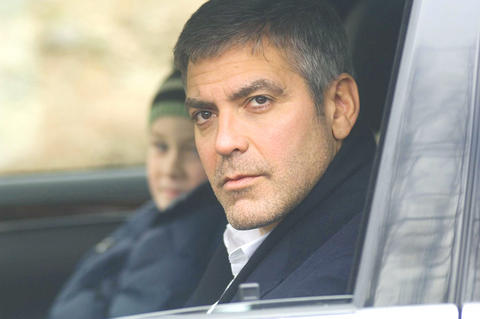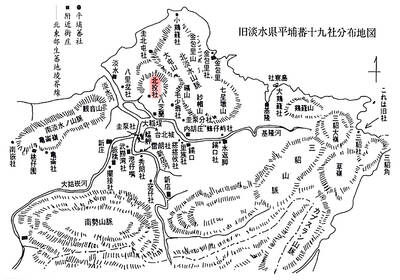Dark in color, mood and outraged worldview, Michael Clayton is a film that speaks to the way we live now. Or at least, the way certain masters of the universe do, as they prowl the jungle in their sleek rides, armed with killer instincts and the will to power. It's a story about ethics and their absence, a slow-to-boil requiem for American decency in which George Clooney, the ultimate in luxury brands and playboy of the Western world, raises the sword in the name of truth and justice and good. Well, someone's got to do it.
And Clooney, who smartly moved away from star-making nonsense like The Peacemaker as soon as he could, has in recent years proved that it's possible to play outwardly different, seemingly contradictory roles (glamorous, righteous) while hopscotching from Hollywood to Darfur and back. You have to be clever to pull this off, and you have to have clever friends like Steven Soderbergh, with whom Clooney created the production company Section Eight. Now defunct, Section Eight dropped bombs, uncorked bubbles, supported independent voices and mucked about in television (K Street). With Syriana, Good Night, and Good Luck, The Good German and now Michael Clayton it also helped Clooney create a singularly contemporary screen identity as a man of unquiet conscience.
In Michael Clayton, written and directed by Tony Gilroy, that conscience seems to have gone MIA, lost amid the dirty wheeling and dealing of a powerful New York law firm. Michael (Clooney) is the firm's designated fixer, though he likes to call himself its janitor. He works in that rarefied gray zone where the barely legal meets the almost criminal and takes lunch at the private club. Michael isn't a member of that club; he just mops up its mess, soothes its Botoxed brow and slips a fat envelope of thank you to inconvenient witnesses. There's a dirty kind of glamour to this world, with its rich trappings and its Ivy League smilers with their gutting knives. Its ugliness seduces as much as it repels and entertains.

PHOTOS: COURTESY OF CMC
Gilroy's previous writing credits include the Bourne franchise and the goofily entertaining legal thriller The Devil's Advocate. (Keanu Reeves is the advocate; Al Pacino, the other guy.) Michael Clayton marks his debut as a director, a gig that seems to have inspired him to watch (rewatch) old Sidney Lumet films. Though Michael is more upscale, smoother around the edges (he probably doesn't own white tube socks), he's a variation on those soulfully alone Lumet cops and lawyers who fight the system and struggle to do the right thing, though not necessarily because they want to. The world Michael wanders in is so darkly sinister, as perilous as that in Lumet's Q & A, that his black coat and suit melt into shadows as depthless as an abyss.
It is an abyss, Gilroy suggests, largely of our own making. There are a few obvious, almost too obvious, villains in Michael Clayton, notably the chief counsel for an agrochemical giant, Karen Crowder, played with twitches and rolls of gut fat by a mesmerizing Tilda Swinton. A Lady Macbeth in pumps and discreet pearls, Karen has pledged her troth to her corporate masters instead of a murderous husband. She's a cliche - brittle, sexless, friendless, cheerless and all the rest - but what makes her work is her unnerving banality, visible in the blank canvas of a face that looks untouched by gentleness or empathy. This is a pitiful creature, as unloved by her writer-director creator as by the genius actress who plays her.
Karen embodies evil, but Michael serves it. His law firm is helping the agrochemical company settle a multibillion-US dollar suit. It seems the company with the smoothly reassuring television commercials (cue the green fields and smiling children) doesn't bring good things to life but death by the hundreds. While working to settle the case, Michael's friend, Arthur (Tom Wilkinson), the firm's star litigator, has an epic meltdown. There's blood on Arthur's manicured hands, though not only his, as Michael discovers through a series of fairly predictable twists and turns. Gilroy hasn't reinvented the legal thriller here, but I doubt that was his intention; at its best and most ambitious, the film plays less like a variation on a Hollywood standard than a reappraisal.
It's a modest reappraisal, adult, sincere, intelligent, absorbing; it entertains without shame. Gilroy directs with a steady hand and a steady eye, too, with none of the visual frenzy that characterizes the Bourne thrillers. His movie moves rather than races. There's a little narrative tricky business (a sizable portion of the story occurs in extended flashback) and an unexpectedly tender moment when Michael stares into a new morning in a country field without uttering a single word. Gilroy's characters talk a lot (they're lawyers, after all), but he knows when to shut them up, an exception being a disappointingly tidy climactic encounter that seems designed to give Clooney the last, rousing word, or maybe just a shot at an Oscar.
That's too bad because the film feels truest when Michael is grappling with his contradictions. His struggle, as well as the film's moody thoughtfulness, the Lumet touches and the agreeable presence of Sydney Pollack in a small role, overtly invokes 1970s American cinema. But Lumet and Pollack didn't give Hollywood its social conscience, which comes and goes and depends on the audience to sustain it. In some ways, Michael is a grimmer, compromised version of Erin Brockovich, the freewheeling legal clerk in the short skirts who leads the charge against social injustice in Soderbergh's populist 2000 drama. (Michael has to be dragged.) The main difference is that the earlier film's optimism feels like a faded signal from a faraway land.
Recently, Clooney has served as a guide into a different country, one in which the media fail, capitalism kills and heroes stumble. His glamour and easy manner make these excursions feel less a matter of duty than of necessity; they provide the pleasure that softens the pain. He does some strong work here, especially when he's nursing his character's misery or gently squaring off against the young actor (Austin Williams), who plays his son. But he's almost always good, and he's a big enough star now that each new role feels as if he's playing a version of himself. That's OK. We need George Clooney, just as we needed Warren Beatty - seducer of heavy hearts and troubled minds, the beautiful bearer of our very bad tidings.
film notes:
MICHAEL CLAYTON
DIRECTED BY: Tony Gilroy
STARRING: George Clooney
(Michael Clayton), Tom Wilkinson (Arthur Edens), Tilda Swinton (Karen Crowder), Sydney Pollack (Marty Bach), Austin Williams (Henry Clayton)
RUNNING TIME: 119 MINUTES
TAIWAN RELEASE: TODAY

Seven hundred job applications. One interview. Marco Mascaro arrived in Taiwan last year with a PhD in engineering physics and years of experience at a European research center. He thought his Gold Card would guarantee him a foothold in Taiwan’s job market. “It’s marketed as if Taiwan really needs you,” the 33-year-old Italian says. “The reality is that companies here don’t really need us.” The Employment Gold Card was designed to fix Taiwan’s labor shortage by offering foreign professionals a combined resident visa and open work permit valid for three years. But for many, like Mascaro, the welcome mat ends at the door. A

The Western media once again enthusiastically forwarded Beijing’s talking points on Japanese Prime Minister Sanae Takaichi’s comment two weeks ago that an attack by the People’s Republic of China (PRC) on Taiwan was an existential threat to Japan and would trigger Japanese military intervention in defense of Taiwan. The predictable reach for clickbait meant that a string of teachable moments was lost, “like tears in the rain.” Again. The Economist led the way, assigning the blame to the victim. “Takaichi Sanae was bound to rile China sooner rather than later,” the magazine asserted. It then explained: “Japan’s new prime minister is

NOV. 24 to NOV. 30 It wasn’t famine, disaster or war that drove the people of Soansai to flee their homeland, but a blanket-stealing demon. At least that’s how Poan Yu-pie (潘有秘), a resident of the Indigenous settlement of Kipatauw in what is today Taipei’s Beitou District (北投), told it to Japanese anthropologist Kanori Ino in 1897. Unable to sleep out of fear, the villagers built a raft large enough to fit everyone and set sail. They drifted for days before arriving at what is now Shenao Port (深奧) on Taiwan’s north coast,

Divadlo feels like your warm neighborhood slice of home — even if you’ve only ever spent a few days in Prague, like myself. A projector is screening retro animations by Czech director Karel Zeman, the shelves are lined with books and vinyl, and the owner will sit with you to share stories over a glass of pear brandy. The food is also fantastic, not just a new cultural experience but filled with nostalgia, recipes from home and laden with soul-warming carbs, perfect as the weather turns chilly. A Prague native, Kaio Picha has been in Taipei for 13 years and